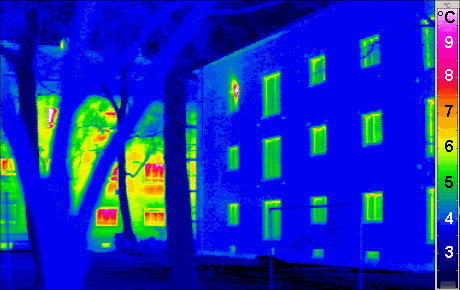
ΑΙhub.org
Machine learning-aided thermography for building heat loss detection
 Image credit: Passivhaus Institut, CC BY-SA 3.0
Image credit: Passivhaus Institut, CC BY-SA 3.0
University of Waterloo researchers have developed a new method that could lead to significant energy savings in buildings. The team identified 28 major heat loss regions in a multi-unit residential building with the most severe ones being at wall intersections and around windows.
Building enclosures rely on heat and moisture control to avoid significant energy loss due to airflow leakage, which makes buildings less comfortable and more costly to maintain. This problem will likely be compounded by climate change due to volatile temperature fluctuations. Since manual inspection is time-consuming and infrequently done due to a lack of trained personnel, energy inefficiency becomes a widespread problem for buildings.
Researchers at Waterloo created an autonomous, real-time platform to make buildings more energy efficient. The platform combines a deep learning method, infrared technology, and a mathematical model that quantifies heat flow to better identify areas of heat loss in buildings.
Using the new method, the researchers conducted an advanced study on a multi-unit residential building in the extreme climate of Canadian prairies, where elderly residents reported discomfort and higher electricity bills due to increased demand for heating in their units. Using machine learning tools, the team trained the program to examine thermal images in real time, achieving 81 percent accuracy in detecting regions of heat loss in the building envelope.
“The almost 10 per cent increase in accuracy with this AI-based model is impactful, as it enhances occupants’ comfort as well as reduces energy bills,” said Dr. Mohamad Araji, director of Waterloo’s Architectural Engineering Program and head of the Symbiosis Lab, an interdisciplinary group at the university that specializes in developing innovative building systems and building more environmentally friendly buildings.
The new AI tools helped to remove the element of human error in examining the results and increased the speed of getting the data analyzed by a factor of 12 compared to traditional building inspection methods.
Future expansions to this work will include utilizing drones equipped with cameras to inspect high-rise buildings.
“The hope is that our methodology can be used to analyze buildings and lead to millions in energy savings in a much faster way than previously possible,” Araji said.
Reference
Machine learning-aided thermography for autonomous heat loss detection in buildings, Ali Waqas and Mohamad T. Araji, Energy Conversion and Management, 2024.
tags: Focus on sustainable cities and communities, Focus on UN SDGs









